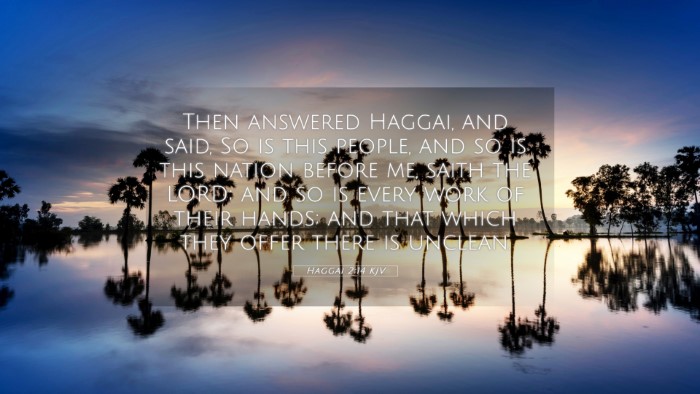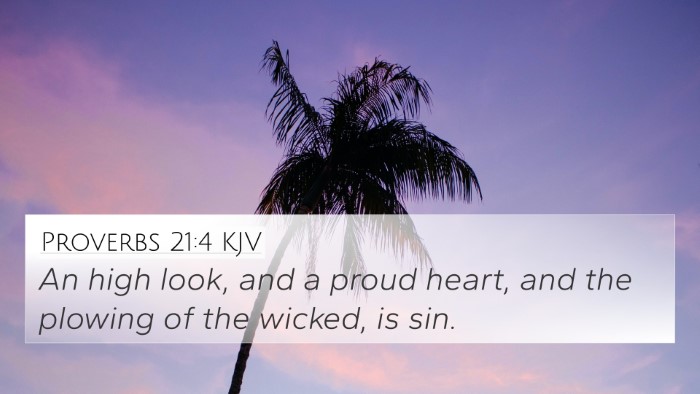Old Testament
Genesis Exodus Leviticus Numbers Deuteronomy Joshua Judges Ruth 1 Samuel 2 Samuel 1 Kings 2 Kings 1 Chronicles 2 Chronicles Ezra Nehemiah Esther Job Psalms Proverbs Ecclesiastes Song of Solomon Isaiah Jeremiah Lamentations Ezekiel Daniel Hosea Joel Amos Obadiah Jonah Micah Nahum Habakkuk Zephaniah Haggai Zechariah MalachiHaggai 2:14 Similar Verses
Haggai 2:14 Cross References
Then answered Haggai, and said, So is this people, and so is this nation before me, saith the LORD; and so is every work of their hands; and that which they offer there is unclean.
Uncover the Rich Themes and Topics of This Bible Verse
Listed below are the Bible themes associated with Haggai 2:14. We invite you to explore each theme to gain deeper insights into the Scriptures.
Haggai 2:14 Cross Reference Verses
This section features a detailed cross-reference designed to enrich your understanding of the Scriptures. Below, you will find carefully selected verses that echo the themes and teachings related to Haggai 2:14 KJV. Click on any image to explore detailed analyses of related Bible verses and uncover deeper theological insights.
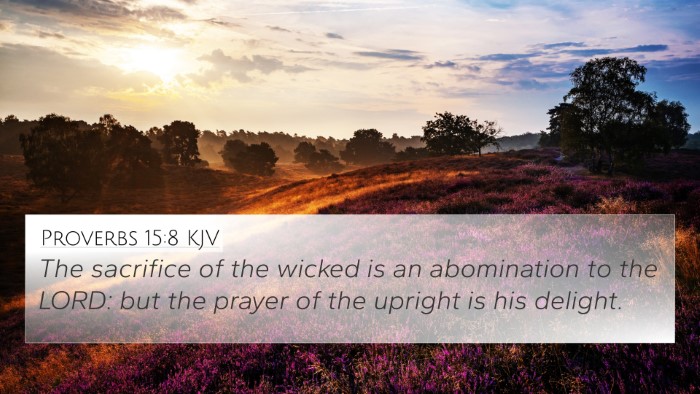
Proverbs 15:8 (KJV) »
The sacrifice of the wicked is an abomination to the LORD: but the prayer of the upright is his delight.

Proverbs 28:9 (KJV) »
He that turneth away his ear from hearing the law, even his prayer shall be abomination.

Isaiah 1:11 (KJV) »
To what purpose is the multitude of your sacrifices unto me? saith the LORD: I am full of the burnt offerings of rams, and the fat of fed beasts; and I delight not in the blood of bullocks, or of lambs, or of he goats.

Haggai 1:4 (KJV) »
Is it time for you, O ye, to dwell in your cieled houses, and this house lie waste?
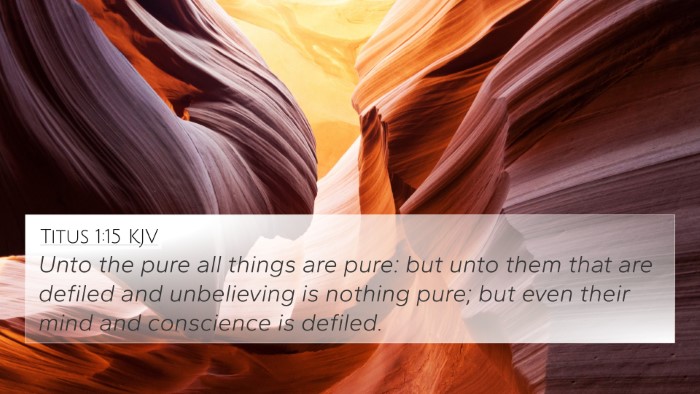
Titus 1:15 (KJV) »
Unto the pure all things are pure: but unto them that are defiled and unbelieving is nothing pure; but even their mind and conscience is defiled.
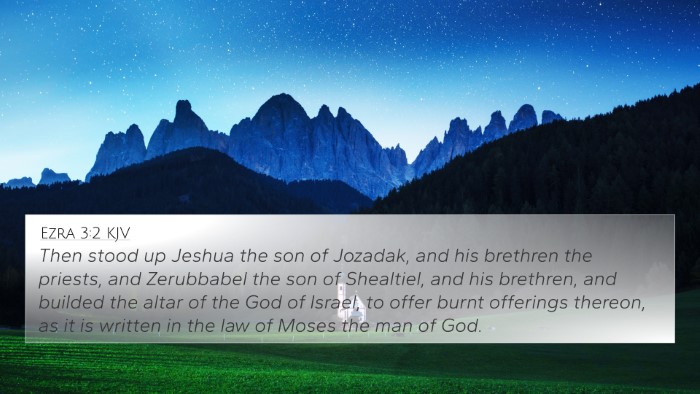
Ezra 3:2 (KJV) »
Then stood up Jeshua the son of Jozadak, and his brethren the priests, and Zerubbabel the son of Shealtiel, and his brethren, and builded the altar of the God of Israel, to offer burnt offerings thereon, as it is written in the law of Moses the man of God.
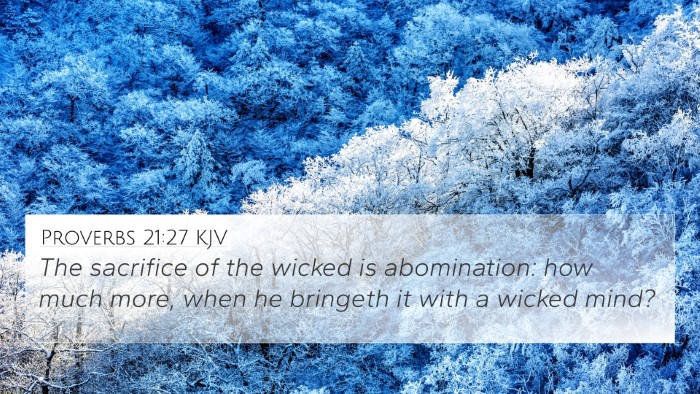
Proverbs 21:27 (KJV) »
The sacrifice of the wicked is abomination: how much more, when he bringeth it with a wicked mind?
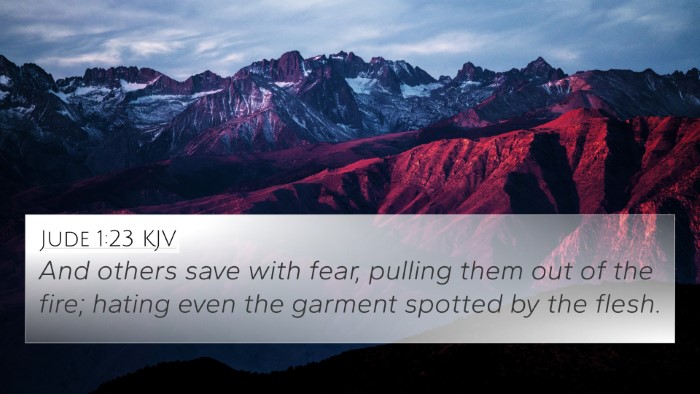
Jude 1:23 (KJV) »
And others save with fear, pulling them out of the fire; hating even the garment spotted by the flesh.
Haggai 2:14 Verse Analysis and Similar Verses
Understanding Haggai 2:14
Verse: "Then Haggai answered and said, 'So is this people, and so is this nation before me, saith the Lord; and so is every work of their hands; and that which they offer there is unclean.'" (Haggai 2:14)
This verse highlights a significant theme regarding the holiness required in the relationship between God and His people. Let's explore its deeper meanings through interpretations from respected public domain commentaries.
Meaning and Insights
-
Matthew Henry's Commentary:
Henry emphasizes the principle that the ceremonial laws of cleanliness represented spiritual truths about the people of Israel. Just as unclean things could not bring purity, neither could an unholy people produce acceptable works before God. This reflects the larger biblical theme that God desires holy offerings from a sanctified people.
-
Albert Barnes' Notes:
Barnes explains that Haggai's message serves as a reminder to the people that their defilement affects their offerings to God. He connects this to the understanding that when they return to their routines without true repentance and a heart changed, their worship and service remain unfruitful. The emphasis is on internal purity being essential for external acts of worship.
-
Adam Clarke's Commentary:
Clarke notes that Haggai uses a metaphor to demonstrate how spiritual decay within the people could contaminate their sacred activities. He correlates this to the understanding that God does not merely focus on the physical act of offering but rather looks at the state of the heart behind the offering. The implication is that God desires sincerity and truth in worship.
Cross-References for Haggai 2:14
To fully appreciate the message in Haggai 2:14, one can explore several cross-references that illustrate similar themes of holiness, defilement, and acceptable worship:
- Isaiah 64:6: "But we are all as an unclean thing, and all our righteousnesses are as filthy rags..." - highlights the inability of man to please God through his works when unclean.
- Zechariah 3:3-4: A vision depicting Joshua the high priest, representing the cleansing of God's people and the importance of being made clean for service.
- James 4:8: "Draw nigh to God, and he will draw nigh to you. Cleanse your hands, ye sinners; and purify your hearts, ye double-minded." - emphasizes the necessity of purity.
- Matthew 5:8: "Blessed are the pure in heart: for they shall see God." - teaches that purity in heart is integral to experiencing God’s presence.
- Psalm 24:3-4: "Who shall ascend into the hill of the Lord? or who shall stand in his holy place? He that hath clean hands, and a pure heart..." - underscores the connection between purity and acceptance before God.
- 1 Peter 1:15-16: Calls believers to be holy in all their conduct as God is holy, indicating a standard for righteous living.
- Hebrews 12:14: "Follow peace with all men, and holiness, without which no man shall see the Lord." - reinforces holiness as essential for relationship with God.
Thematic Connections
The themes in Haggai 2:14 connect deeply with the broader narrative of Scripture, illustrating God's consistent desire for His people to approach Him with clean hands and pure hearts. Let us consider the connections:
- Internal vs. External Purity: Throughout the Bible, the emphasis is placed on the necessity of internal purity for external actions to be deemed acceptable (see Matthew 23:25-26).
- Divine Judgment and Forgiveness: The biblical narrative often connects the state of the people with God's blessings or curses parallel to their purity, as reflected in Jeremiah 17:10.
- The Role of Repentance: Many scriptures (e.g., 2 Chronicles 7:14) highlight the necessity of turning from wicked ways to seek God's favor.
- Consequences of Spiritual Defilement: The idea that a defiled heart leads to unworthy offerings resonates throughout the prophetic writings.
Application and Reflection
In reflecting upon Haggai 2:14, believers are encouraged to assess their own lives in light of the call to holiness. The spiritual state of individuals can influence their worship and service:
- Self-Examination: It is essential for individuals to ask themselves whether their hearts are aligned with the holiness that God demands.
- Emphasis on Holistic Worship: Worship that is rooted in integrity and purity leads to more fruitful service in the world.
- Community Reflection: As a collective, the church must understand how collective defilement can affect its worship and witness.
Conclusion
Haggai 2:14 serves as a potent reminder that God requires both personal and communal purity from His people. The implications of this message ripple through the entirety of Scripture, demonstrating the importance of being set apart for divine purposes.
In conclusion, the teachings connected to this verse encourage believers to cultivate a heart of cleanliness and sincerity, ensuring that their works and worship are pleasing to God.
Further Study and Tools
For those interested in exploring the connections made in this study further, utilizing tools for Bible cross-referencing can be invaluable:
- Using a Bible Concordance can help identify relevant verses that align with specific themes.
- A Cross-reference Bible Study Guide provides structured ways to link similar verses together.
- Employing a Bible Chain Reference allows readers to follow thematic threads through Scripture easily.
Understanding the importance of thematic connections helps deepen one's study of God's Word and enhances hermeneutical methods for interpreting Scriptures.

